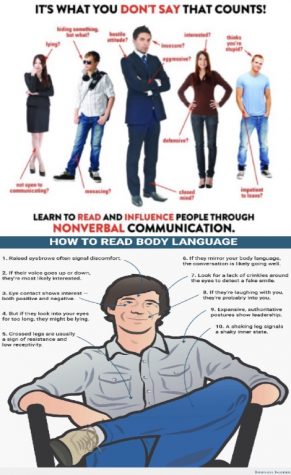Can We “Judge A Book By It’s Cover?”
The phrase “Don’t Judge A Book By It’s Cover” has some problems in my opinion.
April 16, 2021
An age old phrase that people often say is “Don’t Judge A Book By It’s Cover,” a phrase meaning that we shouldn’t judge the character of a person based off of their physical appearance. It is a phrase that has been repeated ad nauseum for many years at this point, but I recently found myself questioning the validity of this phrase. The saying isn’t completely without merit, and oftentimes, people can offer numerous surprises, but I have come around to the belief that the cover of the book, or the way people present themselves physically, is an excellent indicator to how a person lives their life. In addition, as I get older, those surprises I mentioned earlier become less and less frequent, after talking to more and more people.
Whether people are aware or not, the way people look on the outside is always a reflection of themselves, including things we don’t think about much, and seem arbitrary. Things such as what they choose to wear, how tidy their desk is, where they choose to sit in class, what kind of dog they have, what kind of car they drive, and more, all helps project an image of what the person in question is truly like, without even having to talk to them. That is because the things beyond our personality, such as what we decide to purchase help paint a clear picture of what a person values most. One theory potentially linking personality to phenotypical traits is called, “Facultative Personality Calibration” proposed by Lukaszewski and Roney in 2011, claims, “…that each individual’s level of extraversion is calibrated to other traits that predict the success of an extraverted behavioral strategy”. In other words, the study suggests that certain personality traits such as being confident, more outgoing, and talkative can rely heavily on how a person’s physical looks. Granted, there are some issues with the study, as other researchers have pointed out, and is not even entirely what I’m talking about, but it is not wildly off base if one were to simply look at their everyday life.
As an example, let’s say that you see a smaller looking girl exit a newer looking Kia Soul in the school parking lot. She’s walking by herself and wearing a jacket and long pants. She goes straight to the classroom and immediately gets to work, and pulls out her laptop from her bag. What can we infer about this person from just these clues alone? For starters, we can say with almost one hundred percent certainty that this girl is not a party animal and an incredibly social person that’s eager for new experiences. That is simply a fantasy based off the information we have been given. We can infer that she is maybe a bit more shy and introverted, and perhaps struggles with getting out of her comfort zone when talking to other people. That being said, one could also reasonably come to the conclusion that this girl has high grades, is organized, and comes from a good family, based off how much she values her education and the car she drives. A lot of these details are pretty intimate and important details about this person’s life, and yet we are able to picture a general idea of what this person is like without once speaking to her, just from using these external clues.
Whenever I mention my gripe with the phrase “Don’t judge a book by it’s cover”, there is usually one common criticism I receive. It goes something along the lines of, “What if that leads to prejudice?” My answer to that would be that only undisciplined people would reach prejudiced conclusions. Factors such as race and gender are far too broad to really nail down a person’s personality. Not all men act the same and neither do all women. There are certain predisposed attitudes that people have with gender, and to a much lesser extent, race, but that isn’t a good enough determinant to figure out the ins and outs of their personality. If you walk away thinking that all women or all men are the same, you are clearly doing something wrong. Little things reveal far more than the big things. For example, as explained by Deepika Phutela of Tantia University non verbal communication is just as important as what is said verbally. Phutela says, “In addition to these functions, there are many examples of non-verbal communication: paralanguage, body movement, facial expressions, eye messages, attractiveness, clothing, body adornment, space and distance, touch, time, smell, and manners”. All of these are incredibly important factors that are omitted by the phrase “Don’t judge a book by it’s cover”.

Judging a book by it’s cover based on little clues doesn’t have to be bad at all, and can actually be quite helpful in many situations. Let’s go back to the example of the introverted girl I mentioned earlier. If you ever need to talk to her, keep in mind all the context clues I mentioned earlier, and try a more gentle approach and try to make her feel comfortable, as well as maybe asking her about what she’s doing and chat a bit before getting to your main reason for having the conversation. Going in acting bold and attempting to dazzle her with your charm and humor in a loud and boisterous fashion is not the best path to building a friendship in this particular scenario, based off of what we have seen prior to the encounter.
Conversely, if you’re talking to an athlete on the football team, who has strong posture, is in good shape, and is surrounded by a lot of people laughing and smiling while having a conversation, a bolder approach is the perfect way to talk to him. If you used the same approach as you did with the girl, there’s a big possibility that he’d be annoyed or confused about why you’re talking to him. In this case, it would be much better to avoid all the small talk and easing into the conversation that you had with the introverted girl. All of this is technically judging a book by it’s cover, but as these situations demonstrated, it can be used to have better conversations and creates more efficient ways to talk to people from the get go, using some of the clues that are given to you. The best part of using this method of talking to people is that if you’re wrong, it’s a quick adjustment, and not a huge deal!
In conclusion, for the reasons I mentioned above, I believe the phrase “Don’t judge a book by it’s cover” is a largely misguided way of looking at things and can create unrealistic expectations that create tension during interactions. That doesn’t mean that you should judge people by what’s on the outside alone and you certainly shouldn’t make assumptions about people for being a member of a particular race or gender, but that oftentimes what is communicated on the outside such as body language, tendencies, and the company they keep around them all create a shockingly good reflection of how the person acts, and working off of those details can be a good way to get your relationships off on the right foot when utilized properly.


